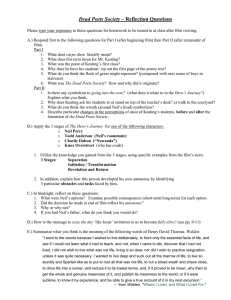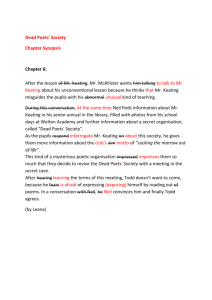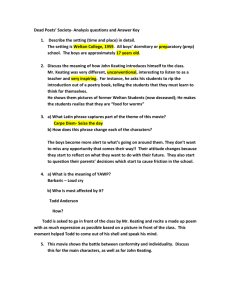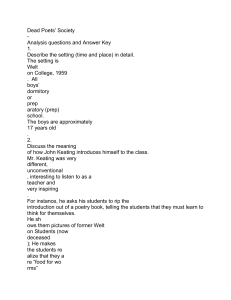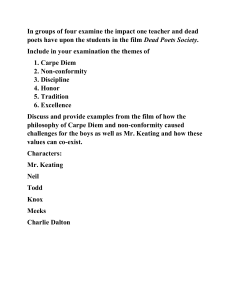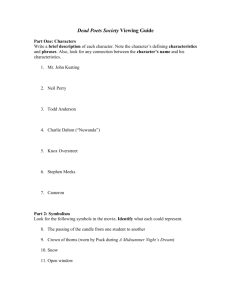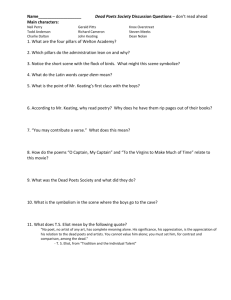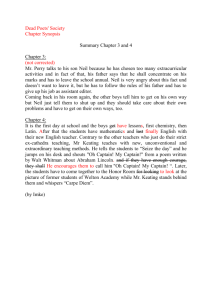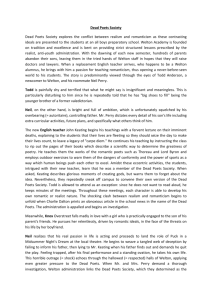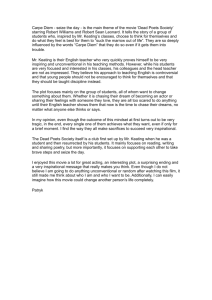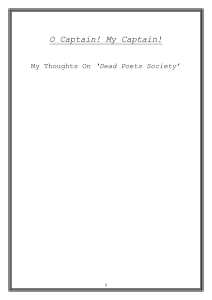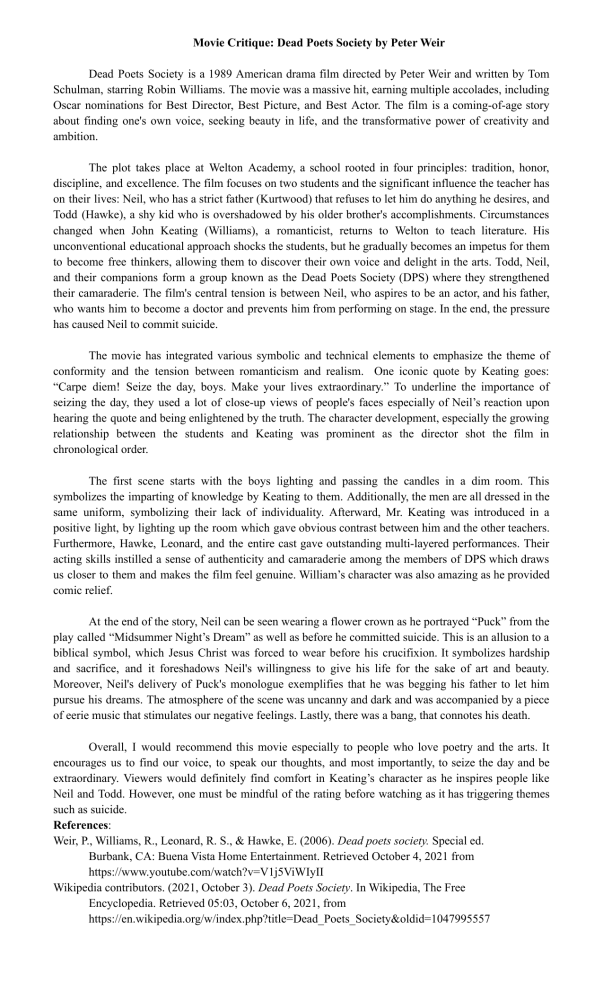
Movie Critique: Dead Poets Society by Peter Weir Dead Poets Society is a 1989 American drama film directed by Peter Weir and written by Tom Schulman, starring Robin Williams. The movie was a massive hit, earning multiple accolades, including Oscar nominations for Best Director, Best Picture, and Best Actor. The film is a coming-of-age story about finding one's own voice, seeking beauty in life, and the transformative power of creativity and ambition. The plot takes place at Welton Academy, a school rooted in four principles: tradition, honor, discipline, and excellence. The film focuses on two students and the significant influence the teacher has on their lives: Neil, who has a strict father (Kurtwood) that refuses to let him do anything he desires, and Todd (Hawke), a shy kid who is overshadowed by his older brother's accomplishments. Circumstances changed when John Keating (Williams), a romanticist, returns to Welton to teach literature. His unconventional educational approach shocks the students, but he gradually becomes an impetus for them to become free thinkers, allowing them to discover their own voice and delight in the arts. Todd, Neil, and their companions form a group known as the Dead Poets Society (DPS) where they strengthened their camaraderie. The film's central tension is between Neil, who aspires to be an actor, and his father, who wants him to become a doctor and prevents him from performing on stage. In the end, the pressure has caused Neil to commit suicide. The movie has integrated various symbolic and technical elements to emphasize the theme of conformity and the tension between romanticism and realism. One iconic quote by Keating goes: “Carpe diem! Seize the day, boys. Make your lives extraordinary.” To underline the importance of seizing the day, they used a lot of close-up views of people's faces especially of Neil’s reaction upon hearing the quote and being enlightened by the truth. The character development, especially the growing relationship between the students and Keating was prominent as the director shot the film in chronological order. The first scene starts with the boys lighting and passing the candles in a dim room. This symbolizes the imparting of knowledge by Keating to them. Additionally, the men are all dressed in the same uniform, symbolizing their lack of individuality. Afterward, Mr. Keating was introduced in a positive light, by lighting up the room which gave obvious contrast between him and the other teachers. Furthermore, Hawke, Leonard, and the entire cast gave outstanding multi-layered performances. Their acting skills instilled a sense of authenticity and camaraderie among the members of DPS which draws us closer to them and makes the film feel genuine. William’s character was also amazing as he provided comic relief. At the end of the story, Neil can be seen wearing a flower crown as he portrayed “Puck” from the play called “Midsummer Night’s Dream” as well as before he committed suicide. This is an allusion to a biblical symbol, which Jesus Christ was forced to wear before his crucifixion. It symbolizes hardship and sacrifice, and it foreshadows Neil's willingness to give his life for the sake of art and beauty. Moreover, Neil's delivery of Puck's monologue exemplifies that he was begging his father to let him pursue his dreams. The atmosphere of the scene was uncanny and dark and was accompanied by a piece of eerie music that stimulates our negative feelings. Lastly, there was a bang, that connotes his death. Overall, I would recommend this movie especially to people who love poetry and the arts. It encourages us to find our voice, to speak our thoughts, and most importantly, to seize the day and be extraordinary. Viewers would definitely find comfort in Keating’s character as he inspires people like Neil and Todd. However, one must be mindful of the rating before watching as it has triggering themes such as suicide. References: Weir, P., Williams, R., Leonard, R. S., & Hawke, E. (2006). Dead poets society. Special ed. Burbank, CA: Buena Vista Home Entertainment. Retrieved October 4, 2021 from https://www.youtube.com/watch?v=V1j5ViWIyII Wikipedia contributors. (2021, October 3). Dead Poets Society. In Wikipedia, The Free Encyclopedia. Retrieved 05:03, October 6, 2021, from https://en.wikipedia.org/w/index.php?title=Dead_Poets_Society&oldid=1047995557
